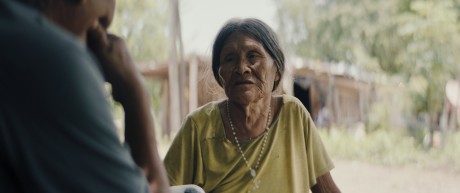


Arami Ullón: Nothing But The Sun

It does not take long in this fine film that you connect to Mateo, the man on the photo, who (from IDFA catalogue) “started recording Ayoreo conversations, stories, and songs in the 1970s, and is still traveling to Ayoreo communities with his now-antique cassette recorder to interview them and collect their voices for his audio archive. Occasionally the device eats a tape, which he fixes with patient fiddling. The conversations express uncertainty about the loss of identity. Is it a problem that a culture disappears in order to adapt to another?”
It’s in Paraguay and the Ayoreo community has suffered since the White people came. A culture is about to disappear. They used, some still do, to live in the forest, a good life as one of Mateo’s interviewes is saying, no illnesses, we could provide for ourselves. But the missionaries came. Mateo is a documentarian, he wants to keep on tape stories, songs and testimonies. And there are some lovely chamanistic scenes in the film. It’s an oral culture, as said Arami Ullón in the conversation with Orwa Nyrabia, artistic director of IDFA. But Mateo is not only collecting memories from his fellow Ayoreos, he also allows himself to start the tape recorder, when he close to his wife asks her, when it was that she fell in love with him… Won’t give you the answer, she gives, watch the film. There are many of these magic moments in the film that lives from its slow rythm and the conversations. «We were shooting blind, we did not understand what was happening », Ullón said in the conversations. “I did not have a plan, the construction happened when we were there”. I was thinking of what Lithuanian director Audrius Stonys once said: “We are making films to keep people alive”, and that is what Ullón does with the help of Mateo.
Making of course also a film about religious oppression, about colonialism, about what happens in a small country like Paraguay – and all over the world.
Paraguay/Switzerland, 2020, 75 mins.